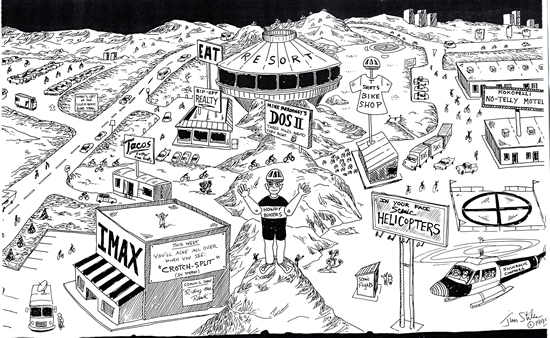 |
||||||
|
|
And if what I fear indeed happens? If the next twenty years sees us pump ever more gas into the sky, and if it sees us take irrevocable steps into the genetically engineered future, what solace then? The only ones in need of consolation will be those of us who were born in the transitional decades, too early to adapt completely to a brave new ethos.–Bill McKibben, The End of Nature, 1989 These days, I’m feeling a lot like Rip Van Winkle. Waking up 20 years too late, I see the American public slowly being dragged, kicking and screaming, to the realization that human activities are causing global warming. But the delay in public acceptance of what science has known for much longer can only mean one thing: the environmentalism that I remember from the 1970s must be long dead. (In the summer of 2008, we’re seeing a lot of "going green" talk in the media and some would say that environmentalism is re-awakening. I’d counter that if it wasn’t for a disastrous war in Iraq, skyrocketing gas prices, a collapsing economy, and a sense that the Earth’s climate might actually be changing, I don’t think we’d be making so much progress on our choice of what kind of shopping bag to use.) Here’s how I see the global warming situation: in order to stabilize greenhouse gases at 450ppm or even 350ppm, (1) we have to drastically reduce total emissions long before 2050. (2) But even if we somehow achieved the truly heroic global implementation of even half of the best ideas we have, we would only succeed in maintaining emissions (3) at today’s out-of-balance levels while global population goes from 6.5 to 9 billion. In short, there is no way we are going to grow our way out of this problem. But amazingly, today’s professional environmentalism, which knows very well the uncompromising nature of this predicament, continues to assume that endless economic growth is an untouchable assumption. So how did this come to pass? How did environmentalism die? And how did its surviving shell end up adopting the language of international finance? But what about McKibben’s more dire prediction: that in the future we would create a new natural ethic that eliminates human moral responsibility for the changes we will cause.(4) Try and digest that for a second before the second hammer-stroke falls: as of 2007, we have done just that. Intro to Nordhaus & Shellenberger Let’s look at the ideas of Ted Nordhaus and Michael Shellenberger (herein, N&S) as published in their original 2004 essay and in their 2007 book, Break Through, From the Death of Environmentalism to the Politics of Possibility. The book hasn’t gotten the same attention that their essay did, maybe because it uses right-wing philosophy in backing progressive policy. It’s true, believe it or not, and that’s why I think nobody wants to be associated with it, including myself. So why would the honest environmentalist want to study it? Well, I think we can learn a lot from their political insights and historical context for environmentalism, ideas we can use to understand what won’t work in the years ahead. Along the way, we have to be careful to distinguish N&S’s analysis from their solution, as I think the former is right on the money, and the latter is "un-environmental", as even they would admit. And what can we learn from the parts of the book that we don’t agree with? First of all, N&S project honest environmental philosophy onto all of mainstream environmentalism when they write things such as: environmentalists imagine solutions that seek to constrain, …human activity and economic growth p.40 The environmentalist obsession with "overpopulation" is typical of the view that ecological crises are essentially about too many people. p.126 I ask you, dear reader, when was the last time a well-funded environmental organization stated publicly that our primary problems are global capitalism and resulting human overpopulation? If your answer is ‘I can’t remember’, then you’ll agree when I say that N&S’s real target in this book is not today’s professional, but instead the honest environmentalist. This is actually good news for us because right-wingers always attack ideas that threaten them. They know that global warming is the ultimate environmental issue, and they’re worried. Very worried. And as for the hapless professionals, well, they’re just going to adapt their principles as needed. Again. Secondly, N&S try to justify in this book what could be described as "the opposite of Deep Ecology", or maybe "the ethics of People First!" If this actually becomes the mantra that the human mob uses to escape responsibility for what’s going to happen to the planet over the next century, many of our artists will find this book to contain useful source material for their work. How America has changed since 1970 But first we’ve got to see what happened to environmentalism. Nordhaus & Shellenberger’s first contribution is their clear understanding of American political values today, and how fundamentally they’ve changed since the original Earth Day. Consider this amazing statement (from today’s vantage point) from Richard Nixon’s 1970 State of the Union address: The great question of the seventies is, shall we surrender to our surroundings, or shall we make peace with nature and begin to make reparations for the damage we have done to our air, to our land, and to our water? p.30-31 That’s right, a Republican president said that then. But this year’s political phenom, Barack Obama, the most capable liberal candidate since the Kennedy’s, wouldn’t touch that sentence with a ten-foot pole. Listen closely to what both McCain and Obama say this fall about global warming: the real benefit of taking action will be to create jobs. Saving the environment? What’s that? So what has happened to us? In a nutshell, it was economic back-sliding. Back in 1970, a high-school graduate could earn a very good living at the steel mills near my hometown with the idea of lifetime employment. After just a few years, that blue-collar guy easily afforded a house, a family, a truck, and plenty of outdoor gear. And he had time off. He could drive that truck to the mountains and camp by an alpine lake, spending days without seeing another soul. With 100 million fewer of us competing for campsites, it’s no wonder environmentalism thrived back then. Of course, those good times in 1970 were just about over. Let’s review what happened: Whereas the median family income grew at an astonishing 100 percent between 1948 and 1973, it grew just 7 percent between 1973 and 1993 – this despite the fact that huge numbers of women were entering the work force, creating a record number of two-income families. By 1990, a higher percentage of the work force was employed than during World War II. p.165 In an economy where real wages are declining, jobs are no longer secure, and health and retirement plans are tied to one’s employment, you get status insecurity (status, community, quality of life at risk) or, as N&S like to call it, Insecure Affluence. Now amid the current "growth recession" in the U.S. we might just call it economic insecurity, unemployment, or "poverty with a (fading) view". Affluence and environmentalism Now we’re ready for N&S’s most important political theory: the majority of voters have to be economically secure before environmental issues can be winners on Election Day. But right away, we should understand this idea within a deeper context than N&S do: the basic human condition has not always been slum residency in a capitalist society. We need to remember that global capitalism has wiped out virtually all non-conforming cultures, mostly, of course, by taking away peoples’ land. Before this theft occurred, native people living off the land in a semi-mobile way knew instinctively that survival depended on living sustainably. Once we see people separated from the land that sustains them, it’s also easy to see that urban poverty = lack of environmental values. And N&S theorize that the complement is also true: Environmentalist values, such as the strong desire to protect ecosystems, largely spring from higher-order, postmaterial, and inner-directed needs. ... The connection between affluence and the birth of environmentalism goes a long way toward explaining why environmentalism in the United States emerged in the 1960s and not in the 1930s. ... And it explains why, when environmentalism does emerge in developing countries, such as Brazil, it does so in Rio de Janeiro’s most affluent neighborhoods, where people have met their basic material needs, and not in its slums, where people live in fear of hunger and violence. p. 28-29 If N&S are right about this, and I think they are, the implications for environmental politics are obvious. Political survival means environmentalists must be publicly concerned with overall economic well-being. In other words, the professionals must become progressives. But then, what about the environment? The honest environmentalist has always known that the global economy destroys the environment. It’s our first principle. And that principle is exactly what the professionals had to sacrifice a long time ago in order to keep their jobs. As an example, let’s look at a 1990 statement of philosophy of the Grand Canyon Trust, first organized during the Reagan era: "From the community to the national level, we need a policy of responsible conservation. The wise use of our resources, so that we may enjoy a world that is productive, healthy and beautiful, is not a matter of the ‘economy versus the environment,’ but of insisting on public institutions and leaders who understand, and will act to ensure, the essential link between the economy and the environment."(5) The emphasis on eliminating the conceptual tradeoff between the economy and the environment was unmistakable, representing a definitive break with 1970s-style environmentalism. Also, its meaning was easily turned around to the progressive political slogan: we can have a growing economy and a healthy environment too!
Autopsy report concluded In summary: the economically secure public of 1970 is dead and gone, resulting in the transformation of the once powerful U.S. environmental movement to little more than a special interest group. Public values are now centered on short-term economics, and laws not conforming to those values are being gutted. Honest environmentalists can now see that we are dead politically; we just don’t have any problem seeing the global economy and the environment as opposing values. Here we have our first hint that cultural criticism should be our weapon of choice. But the report also has to include the professional adaptation to the sea change in public values. By choosing to remain in the political arena, environmental organizations have given up not only their primary purpose but their moral authority on the issue of unsustainable economics vs. nature. But at least they can count on the money continuing to flow in, and they’re going to need all of it. Manipulating public guilt while stroking its progressive conscience is going to require as many spin doctors as the public relations schools can turn out. It’s also the Death of Science Some professional environmentalists may still be waiting for the public’s enlightened scientific understanding of global warming to kick in. But N&S are saying that it doesn’t matter how good the science is when the other side is successfully leveraging values created by economic reality. That’s right, these days economics trumps everything, including science! Now when I was a kid, physical science courses started around the fifth grade while economics was not considered to be one of humanity’s greater achievements of the mind. For the honest environmentalist, society’s abandonment of science when the results are well, inconvenient, gives us our second really good reason to take on the role of the critic. And we can’t let the professionals off the hook here either. They assumed that science would carry the argument, not understanding how politically effective the attacks on the science could be. OK then, the public’s indefensible denial of global warming has been going on since, at the absolute minimum, February 2007, when IPCC AR4 concluded that global warming is human-caused with "very high confidence."(6) How can scientifically educated professionals find any rational basis for staying on society’s bandwagon at this point? The future of progressivism Professional environmentalists now stand at the edge of the abyss. Though unfounded in science, N&S’s proposals make perfect sense from the point of view of progressivism, whose politics we now see that professional environmentalism has no choice but to embrace: - Nothing is more central to this book than our contention that for any politics to succeed, it must swim with, not against, the currents of changing social values. p.6 - Given that prosperity is the basis for ecological concern, our political goal must be to create a kind of prosperity that moves everyone up Maslow’s pyramid as quickly as possible while also achieving our ecological goals. p.6-7 - the most gratifying aspect of the experience [was that] Local environmental leaders told us that they had become more focused on creating a new kind of development than on "protecting the environment." p.10 - We argue for an explicitly pro-growth agenda that defines the kind of prosperity we believe is necessary to improve the quality of human life and to overcome ecological crises. p.15 - if we are to overcome ecological crises, we must no longer put concepts like nature or "the environment" at the center of our politics. p.17 The Really Brave New World In order to justify the abandonment of the environment as a value, N&S must establish a new set of ethics for progressivism to adopt. And they certainly have done that. I would call it something like ‘new rules for a video game planet’. Read ‘em and weep: What’s needed today is a politics that seeks authority not from Nature or Science but from a compelling vision of the future that is appropriate for the world we live in and the crises we face. The idea that we should respect Nature implies that Nature has a particular single being (or dream) to be respected. If we define Nature as all things, then it is not at all clear which natures we should respect and which we should overcome. We are Nature and Nature is us. Nature can neither instruct our actions or punish them. Whatever actions we choose to take in the name of the survival of the human species or human societies will be natural. p.142-143 Given what’s at stake and the quickly diminishing time frame for action, we must quickly embrace a politics that understands that humans are constantly creating new natures. We must abandon the environmentalism that thinks of itself as representing and defending – but never imagining, constituting, or creating – nature. … Overcoming the ecological crises and realizing humankind’s potential will require abandoning efforts to return to some Edenic past. It will require going through modernity and materialism, not avoiding them. And it will require that we leave environmentalism behind as we construct a postnatural politics. p.238 the ecological crises will replace the reductionist question "What must we do to save the environment?" with "What new environments can we imagine and create?" p.239 Besides ignoring the fact that humans will still need food compatible with our biology in the coming centuries, what’s really scary about this is that it attempts to absolve humanity for causing global-scale natural destruction before people have even begun to grasp the moral implications of it all. If followed through, it would be our most damning adaptation to global warming. For example, by mid-century, when the Great Barrier Reef is completely dead8, N&S would have us rationalize it away with something like, oh well, that biology didn’t make the cut. I guess for these guys, the idea of stewardship of the environment is just a big joke. Likewise, if a society chooses to maintain its primacy at the expense of millions of non-human species, then does that society have any character left to defend? No more excuses. Cultural criticism anyone? A critic to remember Perhaps the most memorable quote from the original "Death of Environmentalism" essay criticized the negative message of honest environmentalists by invoking the memory of Dr. Martin Luther King: "Imagine how history would have turned out had King given an ‘I have a nightmare’ speech instead." Having been caught by their lack of study of King’s famous 1963 speech, N&S had no choice but to capitulate on this point in their introduction to Break Through. They now acknowledge that they didn’t know in 2004 that King had actually opened the dream speech with the nightmare of reality. Referring to King’s haunting review of racial injustice at the time, in which he said that "It would be fatal for the nation to overlook the urgency of the moment", N&S now say, In the end, it was probably for the best that King gave a nightmare speech before giving the dream speech. Had he ignored his feelings of frustration and anger, his dream speech would not have been nearly as powerful. Had he avoided the dark valley, the mountaintop would not have been as high or as bright. p.18 Apologists for humanity will no doubt prefer to dwell on the mountaintop, as N&S do throughout the remainder of their book. But we who believe criticism to be the more honest approach should be prepared for a difficult time ahead. We should remember that King’s withering social commentary caused even those who supported him to eventually call him "radical" and "out of touch." (9) What the youngsters will never know: freedom The ability to adapt. It’s humanity’s greatest evolutionary asset and our fundamental character flaw. Leave the past behind. Get on with it. Change Is Good. New Technology. The Market. Work Harder. Don’t Worry. Learn faster. Move. Start a New Life. Get a New Job. Make More Money. Don’t Worry. Everything’s All Right. Don’t Sit There. Keep Talking. Take a Pill. Just Do It. Don’t Worry. Everything’s Fine. ID Confirmed. Tracking Initiated. Have A Nice Day. The Beatles’ "A Day in the Life" is playing in my head. We’re in the long, drawn-out last crescendo. And I am just aching for that final chord.
Notes: 1James Hansen, Makiko Sato, Pushker Kharecha, David Beerling, Valerie Masson-Delmotte, Mark Pagani, Maureen Raymo, Dana L. Royer, James C. Zachos, "Target Atmospheric CO 2: Where Should Humanity Aim?", April 7, 2008 2 IPCC AR4 WGI "The Physical Science Basis", Chapter 10, "Global Climate Projections", p.791. 3 Robert H. Socolow and Stephen W. Pacala, "A Plan to Keep Carbon in Check", Scientific American, September 2006. 4The End of Nature, Bill McKibben, Anchor Books, Doubleday, 1989, p.169 5 Jim Ruch, Grand Canyon Trust Executive Vice President, from The Colorado Plateau Advocate, A Publication of the Grand Canyon Trust, September 1990, p.5 6 IPCC AR4 WGI "The Physical Science Basis", "Summary for Policymakers", p.3. 7 IPCC AR4 WGII "Impacts, Adaptation and Vulnerability", Chapter 4, "Ecosystems, their properties, goods and services", p.235 8 "Black anger and the pulpit" By Erin Aubry Kaplan, Special to the Los Angeles Times, Friday, March 21, 2008 9http://www.azdailysun.com/articles/2008/03/21/news/opinion/guest_columnist/20080321_guest_14.txt |
|||||







